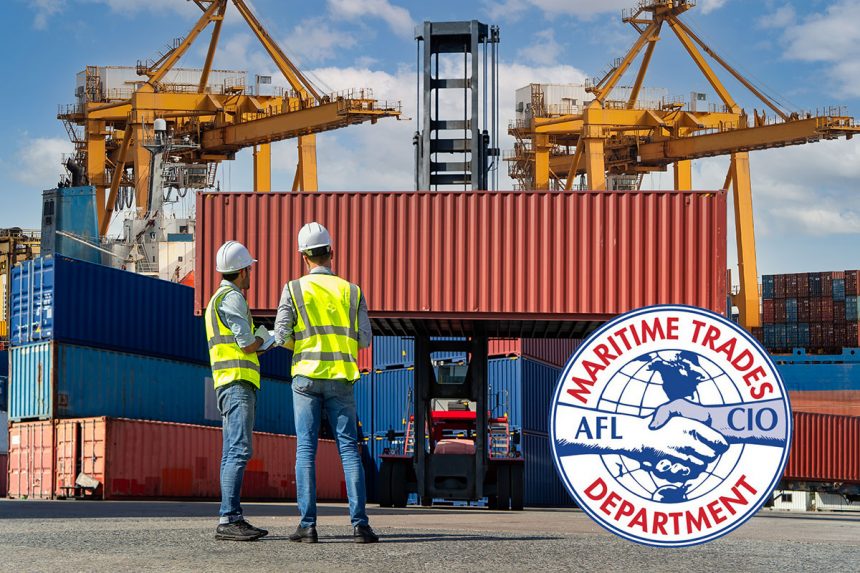
The MTD Executive Board reaffirmed the department’s long-held position that America needs strong cargo preference laws for the nation’s defense and economic security.
Three different statements approved by the board during its meeting March 9 and 10 in San Antonio dealt with such support, as well as a guest speaker on the 10th. From one document simply entitled “Cargo Preference” to the others called “Food for Peace” and “The Export-Import Bank,” the MTD called for elected leaders in Washington to “take a stand and develop a maritime policy that ensures a viable, balanced and dependable ocean transportation capability.” The “Cargo Preference” concluded with a call for the department, affiliates and Port Maritime Councils to “continue to defend the cargo preference programs, and push to restore the American fleet with a steady stream of cargo.”
To punctuate these calls for action was Anthony Fisher, the U.S. Maritime Administration’s (MarAd) Deputy Associate Administrator for Commercial Sealift, who stated: “When somebody tells you that cargo preference is too expensive, you ask them whether or not they would prefer that a foreign government control our economy and control our future.”
Fisher debunked the myth that using U.S.-flag ships and American crews adds significant cost to cargo preference programs. Using official government data, he explained, “The reality is, ocean transportation in itself is dirt cheap. Ocean transportation is such a nominal cost component of a supply chain that whether or not you’re going to spend that extra $1,000 a box to move that 40-foot container from this side of the globe to the other side of the globe, it’s [insignificant]. It doesn’t make a difference when you look at the grand scheme. It makes an incredibly nominal difference when you look at the total cost to provide that commodity to where it’s going.”
Cargo preference laws require that all government-impelled military cargoes and half of government-impelled civilian cargoes move on American-flag, U.S.-crewed ships. However, the latter percentage had been 75 before it was reduced in 2012 via a backroom, middle-of-the-night legislative attack.
That reduction has taken a severe toll, Fisher explained. Since 2012, “We’ve lost close to a quarter of our oceangoing merchant fleet. We’ve dropped down from 106 vessels to 81 vessels,” he said.
He added that the industry also is confronted by “shrinking volumes. This is the problem we face at MarAd, and this is the problem that you face in the fleet. We’re getting a smaller slice of a smaller pie.”
The total cost of cargo preference is around $300 million per year, but even that relatively small figure essentially shrinks “when you talk about taxable revenues and economic multipliers,” Fisher added.
It should appear even smaller when comparing U.S. investment in the maritime industry with that of other nations. Fisher spotlighted examples of foreign subsidies for the maritime industries in China and South Korea, respectively, both of which completely dwarf such spending in the U.S. It has worked for China, which quadrupled its merchant fleet in the last decade. France, Germany and India also either have in place or are implementing laws and programs to bolster their fleets, Fisher reported.
Moving to other subjects, Fisher noted the Maritime Administration enjoys a “strong partnership” with the Defense Department (DoD). “They understand the value of the merchant fleet,” he said. Nevertheless, the DoD cargo volumes currently being moved are a small fraction of what they were at the heights of Operation Iraqi Freedom and Operation Enduring Freedom.
Finally, he reminded the board that the U.S. Export-Import Bank also is important for U.S. shipping, but it has been politically neutralized (due to board vacancies that prevent it from approving financial assistance of more than $10 million). There are $20 billion in projects “sitting at the starting line, waiting for a quorum…. The companies involved in those projects want to build these commodities in the United States,” Fisher said. “They want to employ Americans. They want to employ American manufacturers. They want to employ American mariners. But these projects aren’t going to hang around forever. We don’t have the only Export-Import Bank.”
He said foreign competitors are “strong and they’re active and they’re growing.” China, for instance, backed $100 billion in loans last year.
The Trump administration recently signaled support for fully reviving the U.S. Export-Import Bank, something the MTD strongly back in its statement.

